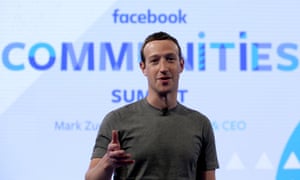
When Facebook announced it was tuning out publishers and brandsto focus on friends, family and “meaningful interactions”, my immediate response was relief. I desperately want tech companies like Facebook to be fully aware of the impact they’re having on society and to take responsibility for when they steer us down dark paths. But I quickly realised something important was missing.
Facebook chief executive Mark Zuckerberg explained that this new direction was arrived at through research into social media. The findings say that when we use Facebook to communicate with people in our network we feel connected, and this can lead to long-term happiness. But when we passively scroll through a feed full of articles and videos, the results might not be as rewarding. “We feel a responsibility to make sure our services aren’t just fun to use but also good for people’s wellbeing,” the CEO explained in a Facebook post last week.
Zuckerberg is essentially saying that the problem – and its remedy – boil down to the contents of the news feed. But there’s a bigger issue he failed to mention. Psychologists and academics have long been sounding the alarm over the addictive qualities of social media, which extend far beyond the news feed. A number of concerned former Facebook employees, including Sean Parker (played by Justin Timberlake in The Social Network), have come forward to confirm that many of the platform’s features were consciously engineered to induce a dopamine hit in order to keep people hooked.
It worked. In 2016, Zuckerberg revealed that users spend an average 50 minutes a day across Facebook, Facebook Messenger and Instagram. That’s a decent chunk of our waking hours. With more than 2 billion monthly active users, the company has successfully woven itself into the fabric of global society, but are the methods it used to achieve this in line with its new emphasis on wellbeing? If the answer is “no” does this mean Zuckerberg and his team are now prepared to loosen their grip on our daily lives?
Take Facebook Messenger, for instance, which imposes mandatory read receipts that let your contacts know when you’ve seen their message. This is a common feature in messenger services, but unlike WhatsApp and even Twitter, Facebookhasn’t made read receipts optional. This tiny tick at the bottom of your conversations is designed to pressure you into responding instantly to avoid the subtle social implication of someone thinking you’re ignoring them or not making the time to reply. It’s emotionally manipulative and entirely avoidable.
What about Facebook Live? Last week’s announcement highlighted the engaging nature of live videos, which, on average, receive six times as many interactions as regular videos. But if we interact with something, does that automatically make it good for us? When Facebook was desperately trying to make live video work, did it consider that it might be perpetuating our growing impulse to stay glued to the screen and that this might be bad for our health?
Mounting studies show that addiction to technology is having an effect on our emotional world and cognitive abilities. Clifford Nass, a Stanford University professor who passed away in 2013, warned that chronic media users find it difficult to filter out irrelevant information and have serious problems managing working memory. A report from the Royal Society for Public Health found that social media use is linked with increased rates of anxiety, depression and poor sleep in young people. Encouragingly, Facebook has said it will investigate these issues in 2018, but there’s a conflict of interest.
Facebook’s business model has relied on social-validation feedback loops, which keep people coming back for more – cue billions worth of revenue from advertising. Changing this requires a major culture shift within the company’s 17,000+ workforce, not to mention at Facebook-owned Instagram. We shouldn’t underestimate how difficult and slow that process could be. Not long ago, in 2016, a Facebook spokeswoman told the New York Times that “the better we do at providing what people most want to see, the more likely they are to return to the app and spend time”.
If Facebook wants to do right, it needs to be prepared to give up the tactics that made it king. It needs to feel content with playing a smaller role in our lives. Joining it on this mission should be Google, Apple and any other tech company that attempts to secure its future, whether it intends to or not, at the cost of public health. Facebook’s commitment to changing the tide is commendable, but just as we wouldn’t expect tobacco or food companies to navigate the ethics of their products free from regulation, it can’t do so on its own: governments must band together and tackle this crisis before it swallows us whole.
• Eleni is a digital producer at the Guardian focusing on social media and video.
SOURCE:-theguardian

